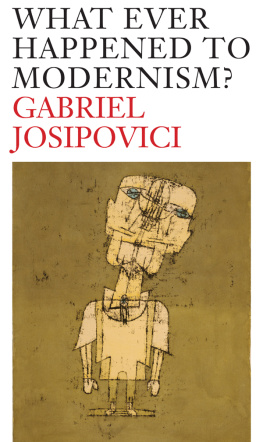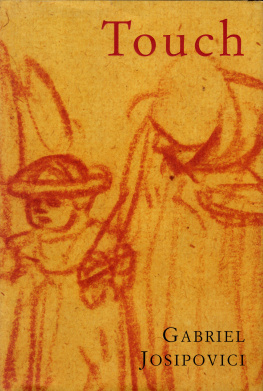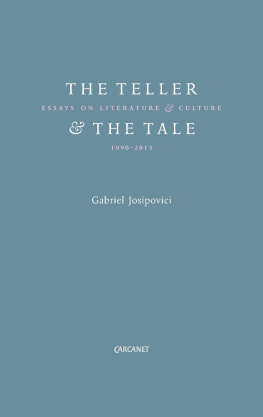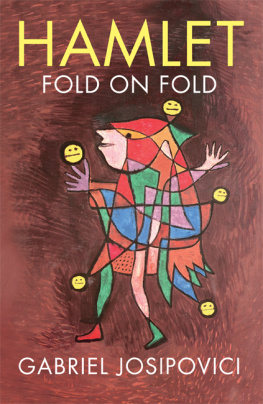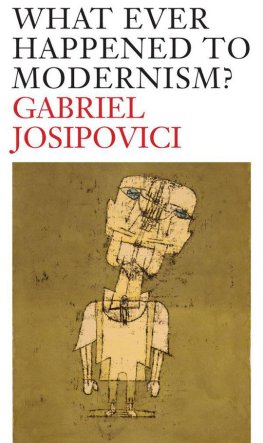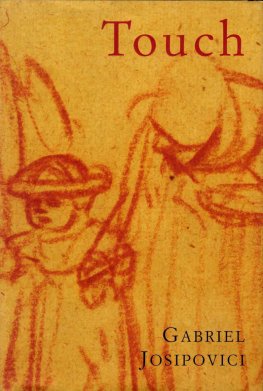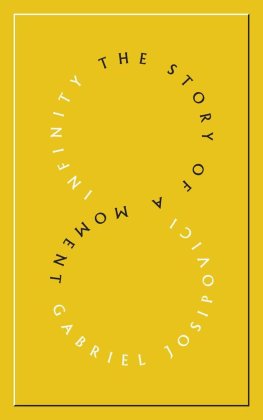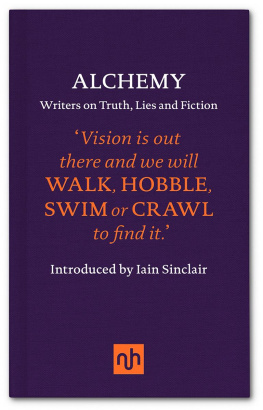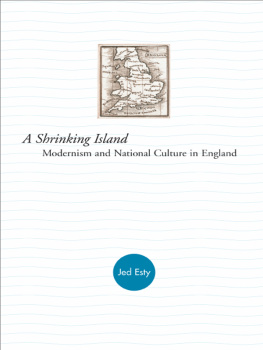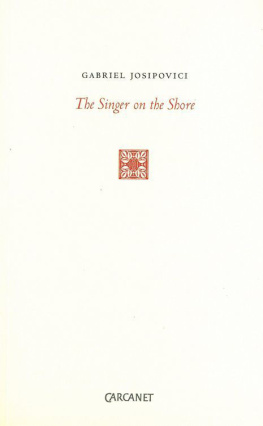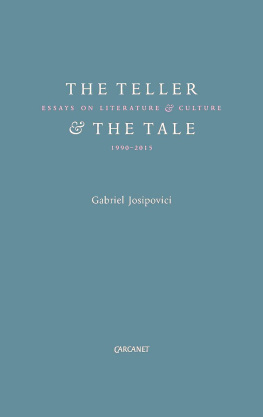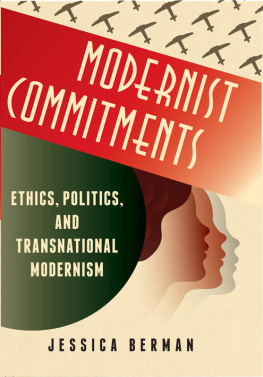What Ever Happened To Modernism?
WHAT EVER
HAPPENED TO
MODERNISM?
GABRIEL JOSIPOVICI
YALE UNIVERSITY PRESS
NEW HAVEN AND LONDON
Copyright 2010 Gabriel Josipovici
All rights reserved. This book may not be reproduced in whole or in part, in any form (beyond that copying permitted by Sections 107 and 108 of the U.S. Copyright Law and except by reviewers for the public press) without written permission from the publishers.
For information about this and other Yale University Press publications, please contact:
U.S. Office: sales.press@yale.edu www.yalebooks.com
Europe Office: sales@yaleup.co.uk www.yaleup.co.uk
Set in Janson Text by IDSUK (DataConnection) Ltd
Printed in Great Britain by TJ International Ltd, Padstow, Cornwall
Library of Congress Cataloging-in-Publication Data
Josipovici, Gabriel, 1940
What ever happened to modernism?/Gabriel Josipovici.
p. cm.
ISBN 978-0-300-16577-7 (cl: alk. paper)
1. Modernism (Literature) I. Title.
PN56.M54J67 2010
809'.9112dc22
2010020776
A catalogue record for this book is available from the British Library.
10 9 8 7 6 5 4 3 2 1
To Gordon Crosse and John Mepham
Nothing is granted me, everything has to be earned, not only the present and the future but the past too something after all which perhaps every human being has inherited, this too must be earned, it is perhaps the hardest task.
K AFKA , Letters to Milena
Certain events would put me into a position in which I could not go on with the old language games any further. In which I was torn away from the sureness of the game.
W ITTGENSTEIN , On Certainty
Do you mean to say the story is finished? said Don Quixote.
As finished as my mother, said Sancho.
M IGUEL DE C ERVANTES , Don Quixote
Contents
Figures

Preface
T he first extra-curricular lecture I attended at Oxford was an address given to the Literary Society by Lord David Cecil on the topic of The English Novel Today. It was the autumn of 1958. I had just spent a happy year between school and university getting to know London, the first city I had ever lived in, and using the wonderful Putney and Wandsworth public libraries to read my way through as much of world literature as I could, starting with the writers I had discovered in my last years at school, Eliot, Donne and Kafka, and going on to Tolstoy and Dostoevsky, Proust and Mann. Now I hurried to Lord David's lecture, eager to discover who were the English writers currently at work who were, so to speak, following in those footsteps.
I remember nothing about the lecture except that it was full to the rafters, suggesting that I was not the only one who had come eager to learn, but I did come away with a list of names: Anthony Powell, Angus Wilson and, said Lord David, a young writer to watch, Iris Murdoch. However, when I borrowed their work from the library I was disappointed to find that they seemed to have nothing whatsoever in common with the writers I had been reading. They told entertaining stories wittily or darkly or with sensationalist panache, and they obviously wrote well, but theirs were not novels which touched me to the core of my being, as had those of Kafka and Proust. Since I had plenty to do learning Anglo-Saxon and reading the authors on the syllabus, plus the still unread works of Thomas Mann, I did not stop to ask myself why this should be so and whether the fault lay with me or with them, but simply let the matter drop.
Three years later, as a graduate student, I felt that the time had come for me to take a new look at the English novel today. I had discovered Borges, first in the pages of Encounter and then in French translation on the shelves of the old Parker's, and I had just been reading all the books of Claude Simon I could lay my hands on, having been alerted to him by a glowing review by Philip Toynbee in the Observer of his most recent novel, L'Herbe, with its wonderful epigraph from Pasternak: No-one makes history, we do not see it, any more than we see the grass grow. Alain Robbe-Grillet had also recently visited Oxford as a guest of the Maison Franaise, as a result of which I had read Le Voyeur and was still reeling under the impact. It was clear that out there in Argentina and France and no doubt in lots of other countries there were writers whose work belonged to the same world as that of Proust and Kafka and Eliot. It was time to take another look at their English counterparts and see if I had misjudged them. To my disappointment I quickly discovered that whatever it was that had put me off the first time round had not gone away. They still said nothing to me, still seemed to be English in a way Borges and Simon and Robbe-Grillet were not Argentinian or French, still seemed to belong to a different and inferior world to that of Proust and the others.
In the course of the following decades, in the intervals between writing my own novels and plays and my teaching duties, I sometimes turned to writing about those authors who meant much to me, dead ones like Kafka and Proust, and living ones like Borges, Bellow, Georges Perec and Aharon Appelfeld. There were only two English authors in this personal pantheon: William Golding, whose best work, I felt, had been done before the mid-1960s, and Muriel Spark, who had left England for New York and then Italy. In my innocence I imagined that by writing about these authors I would not only make people see what they were really up to, but could also help them grasp the nature and implications of that Modernism of which I felt they formed a part. Instead of which I found that English culture was actually growing steadily less interested in or aware of these issues. The Encounters and the Philip Toynbees, magazines and critics with a European sensibility, whose imaginative borders stretched beyond Victorian and postwar England, had long gone and not been replaced, and the new lead critics of the Sunday papers and cultural weeklies, though many of them would have been horrified to know it, held fundamentally the same views as had Lord David Cecil in the late 1950s. The lending libraries, too, which had been one of the glories of the Britain on whose shores I had landed in 1956, had slowly withered and, in some cases, died. I read all the new writers these critics recommended, for one is always looking for something exciting and fulfilling to read, but I invariably came away with the same sense of disappointment as I had had when seeking to follow up Lord David's recommendations. Occasionally I wondered why my own feelings and those of the reviewers and critics were so much at odds, wondered, indeed, who was right, me or the entire establishment. I didn't think I was mad (though of course the mad rarely do), and I did occasionally meet people who shared my tastes, so how was this anomaly to be explained?
This little book is an attempt to answer that question. It has not been easy to write. For reasons I discuss in the final chapter, a book of this kind must inevitably be personal, but that does not mean that it should be merely subjective: I wish to persuade my reader, not simply air my opinions. Yet it is difficult to walk the thin line between didacticism and rant, and between giving too much information and too little. In writing about a single author or work such issues do not arise: one focuses on the object and everything has to be directed towards the one aim of bringing out into the open what one thinks makes that author or work important and meaningful. But what should be the focus of a book like the present one? At times it seems to be nothing less than life itself, at others a problem of syntax. That is why there are so many excellent books on individual Modernists, such as Hugh Kenner's
Next page
